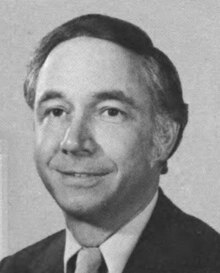Bill Gradison
| Bill Gradison | |
|---|---|
 |
|
| Member of the U.S. House of Representatives from Ohio's 2nd district |
|
|
In office January 3, 1983 – January 31, 1993 |
|
| Preceded by | Tom Luken |
| Succeeded by | Rob Portman |
| Member of the U.S. House of Representatives from Ohio's 1st district |
|
|
In office January 3, 1975 – January 3, 1983 |
|
| Preceded by | Tom Luken |
| Succeeded by | Tom Luken |
| 51st Mayor of Cincinnati, Ohio | |
|
In office 1971–1971 |
|
| Preceded by | Eugene P. Ruehlmann |
| Succeeded by | Tom Luken |
| Personal details | |
| Born |
Willis David Gradison, Jr. December 28, 1928 Cincinnati, Ohio |
| Political party | Republican |
| Alma mater |
Yale University Harvard Business School |
| Religion | Judaism |
Willis David "Bill" Gradison Jr. (born December 28, 1928) is an American politician from Ohio who served in the United States House of Representatives from 1975 to 1993.
Gradison, a Republican, was born in Cincinnati, Ohio and received a bachelor of arts degree from Yale University in 1949, a master's degree in business administration from Harvard University's Graduate School of Business Administration in 1951, and a doctor of commercial science degree from Harvard in 1954.
Gradison worked as an investment broker and then served as assistant to the undersecretary of the treasury (1953–1955), and assistant to the secretary of health, education, and welfare (1955–1957).
He was then elected to the Cincinnati city council, on which he served from 1961 to 1974. This service included a term as mayor of Cincinnati in 1971 (a position that at the time rotated among council members). Gradison was first elected to the U.S. House of Representatives in 1974 and began serving in 1975 (94th Congress). He began representing Ohio's District 1, but after the 1980 census, he and Tom Luken effectively switched districts, with Gradison's district renumbered as District 2. He served until 1993, when he resigned to accept the lobbying position of president of the Health Insurance Association of America.
The 1981, 1984, and 1986 tax acts and the 1983 Social Security act were some of the most important legislation initiated by the Ways and Means Committee during the 1980s.
In Congress, "Bill" was a member of the U.S. House Ways and Means Committee, during the 95th through the 101st U.S. Congress, and was closely involved in many successful legislative efforts. One effort was the original sponsorship of the bill providing the income tax indexing clause that was later inserted into President Reagan's famous tax reduction bill of 1981, called The Economic Recovery Tax Act of 1981. This indexing made it so that income tax brackets would automatically be moved up as the inflation rate rose, so that "bracket creep" would be avoided, whereby income tax rates rise only because of inflation, not because of a rise in deflated income levels. This addition to the 1981 tax bill was very popular, as indicated by its co-sponsorship by a majority of members of the U.S. House of Representatives (sponsorship by a majority of members indicates the bill would be passed if put up for a vote on the House floor).
...
Wikipedia
